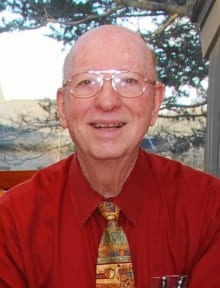On May 11, Moorestown Friends welcomed Quaker religion and social justice advocate Dan Seeger. He provided opening remarks at the Middle and Upper School Meetings for Worship, sharing his personal account of defying the 1948 military-draft law as a conscientious objector and how his Supreme Court case impacted the conversation surrounding pacifism during wartime.
Seeger recounted that his anti-war feelings first stirred in his youth. Every Saturday afternoon, he would head to the movie theater and, during the newsreels, he would be exposed to the horrific images of World War II.
“The carnage from the newsreels made a deep impression upon me,” said Seeger. “I thought nothing good could come from this, and I could never participate in war. This was a time period where the entire world embarked on a nuclear arms race and the major powers were ready to annihilate all human life – for mutual assured destruction. So when the draft board began trying to draft me, I said I could not participate in military service, although the law required service of all young men.”
Because Seeger did not religiously identify with a specific faith practice at the time, he did not meet the religious criteria for conscientious objector status. For his refusal to enter the army, Seeger was convicted of violating the 1948 Military Selective Service Act and, consequently, he enlisted the legal counsel of the American Friends Service Committee in New York City. From the late 1950s until 1965, Seeger’s case rose through the court system from the local draft board to the U.S. Supreme Court. In the final ruling of United States v. Seeger, the Supreme Court unanimously found, as interpreted by the freedom of religion constitutional clause, that Seeger’s religious principles met the criteria of conscientious objector status.
Seeger was surprised by his unexpected “celebrity status” for the week following the case decision, but understood how impactful the ruling was for pacifists around the world, as the decision landed during the U.S. escalation of the Vietnam War.
Following his case, Seeger became heavily involved with Quakerism in his professional and personal life and rose to become one of the foremost thought leaders within the religion. He has served as a trustee on the MFS School Committee from 2005 to 2014, as Executive Director of Pendle Hill, the Quaker Center for Study and Contemplation in Wallingford, PA, and New York Regional Director for American Friends Service Committee. Seeger is currently a board member for both Friends Center Corporation and the American Friends Service Committee and is active in the Friends World Committee for Consultation.
Reflecting upon his own spiritual path, Seeger concluded his brief speech with thoughtful musings and encouraging advice for the Middle and Upper School students.
“We are lucky in our American life to have religious pluralism, where we can express our own religious views and live together in an atmosphere of mutual support and active sympathy,” said Seeger. “Your job, as young people, will be to lay the seeds of a new civilization. This proposition should not scare you, but should inspire joy and gratitude and prompt you to find great meaningful work. We must continue to defend human decency and progress with reconciliation, peace, and love.”
Photo from the American Friends Service Committee

